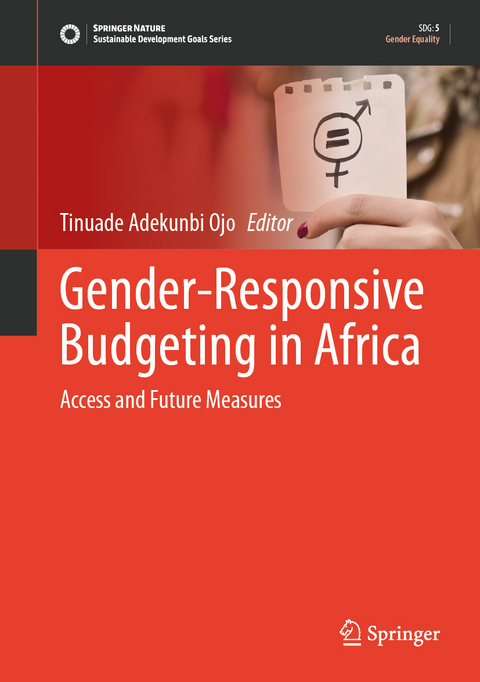
Gender-Responsive Budgeting in Africa
Springer International Publishing (Verlag)
978-3-031-53332-7 (ISBN)
Africa is the leading region in the world in the expansion of mobile money transactions, according to Global Findex. The book presents several significant themes and African states' efforts to address the political and economic factors influencing budget allocation to women-oriented programmes and projects in African communities. The book further investigates the impact of gender-responsive budgeting on women's empowerment and gender equality in these communities. The findings intend to analyse the effectiveness of the countries' approaches and share lessons that different African economies, whether currently booming or struggling, can enhance or implement toward gender budgeting response at all structural levels.
Gender budgeting is an important tool in response to the growth and development of the economy. The themes identified will guide gender budgeting response, and how gender is incorporated into these approaches (if at all). The main objective of this volumeis to understand different processes of gender budgeting in response to gender issues at a national level. And to help encourage reflection on what lessons could be learnt between states and what factors cause divergence in multilateral settings so that they can be understood and hopefully addressed.
Dr Tinuade Adekunbi Ojo is the unit head for Pan African Women Studies at the Institute of Pan African Thought and Conversation. She is very passionate, energetic, and authentic with her approaches. She is a GLOBAL TRANSFORMATIONAL KEYNOTE SPEAKER, EDUCATIONAL CONSULTANT, and MENTORING COACH who impact others for PURPOSE!. She also serves as an academic and researcher at the Department of Politics and International Relations and the 4IR and Digital Policy Research Unit at the University of Johannesburg. She holds a PhD in political science from the University of Pretoria. Her master's and honours were in Development Studies from UNISA. As a feminist political economist, her work explores the gendered dimension of trade, financial inclusion, sustainable development goals, digital transformation in policy, politics and digitalization, international political economy, gender inequality and poverty reduction strategies. Tinuade has published a wide range of works on gender and development policy, the IMF's external relations with Africa, BRICS, Southern Africa, and West Africa, focusing on the political economy of trade and aid. In addition, she has acted as a peer reviewer for renowned scientific journals.
Additionally, Tinuade is a senior research fellow for the African School of Governance and Policy Studies and a research associate at the African Centre for the Study of the United States (ACSUS-UP). She has held and still holds various administrative portfolios, including tutor, supervisor, usher, mentor, and administrator for postgraduate students. She is an Associate Editor for African Journal for Political Science (AJPS), and BRICS Journal and Managing Editor and Researcher for the Digital Policy Studies Unit (4DPRU) at Johannesburg. Tinuade is a member of international and local associates, CAAS, IPSA, AAPS, ASA, DSA, UNASA UP, SACE, SAAPS, and others. Tinuade is the African Association of Political Science (AAPS) program officer. She is responsible for Partnership and Resource Mobilization for CBWN-Africa. Additionally, she receives many awards, scholarships and grants, presented at local and international conferences.
Tinuade has also worked with several civil societies and international institutions to advance the course on women's economic empowerment and sustainability.Chapter 1: Gender Budgeting Response in African Economies: Access and Future Matter.- Chapter 2: Gender Budgeting Responses on Gender-based Violence (GBV) in Sub-Saharan Africa (SSA): Lessons from Selected Countries.- Chapter 3: Gender-Responsive Budgeting in Climate Change Financing: A Panacea for Confronting Climate Change Vulnerability in South Africa?- Chapter 4: The Political Economy of Gender-Responsive Budgeting in Nigeria.- Chapter 5: Parliamentary Female Representation and Party Candidate Selection Methods in Zambia.- Chapter 6: The Role of Legislature in Achieving Gender Responsive Budgeting in Nigeria.-Chapter 7: Gender Pay Gap and Pension Fund for Women in South Africa.- Chapter 8: Financial Inclusion for Women in Nigeria: Much Ado About Access.- Chapter 9: Financial Exclusion, Gender, and the Lure of Boko Haram Vesna Markovic and Sven Botha.- Chapter 10: The Role of Gender-budgeting in Mainstreaming Women in Peacebuilding in Africa.- Chapter 11: Can women put their breasts on a hot paraffin lantern and go to sleep? Interrogating the anguish of financing Small and Medium Scale Enterprises (SMEs) with microcredits in Nigeria.
| Erscheinungsdatum | 26.04.2024 |
|---|---|
| Reihe/Serie | Sustainable Development Goals Series |
| Zusatzinfo | XX, 128 p. 7 illus. |
| Verlagsort | Cham |
| Sprache | englisch |
| Maße | 178 x 254 mm |
| Themenwelt | Naturwissenschaften ► Biologie ► Ökologie / Naturschutz |
| Naturwissenschaften ► Geowissenschaften | |
| Sozialwissenschaften ► Politik / Verwaltung | |
| Wirtschaft ► Betriebswirtschaft / Management ► Unternehmensführung / Management | |
| Wirtschaft ► Volkswirtschaftslehre | |
| Schlagworte | African fiscal policies • Gender Budgeting • Mobile money transactions • SDG 5 • Women's empowerment in Africa |
| ISBN-10 | 3-031-53332-1 / 3031533321 |
| ISBN-13 | 978-3-031-53332-7 / 9783031533327 |
| Zustand | Neuware |
| Haben Sie eine Frage zum Produkt? |
aus dem Bereich


